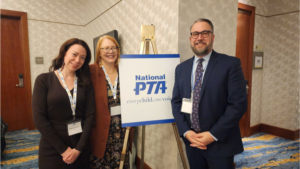Blog Manager’s Note: I don’t know about you, but I know that I have lost count of how many days we’ve been under orders to “shelter in place.” Although absolutely necessary, this isn’t easy, especially as more and more states make the decision to close school doors for the rest of this academic year. Thankfully, trauma-informed virtual schooling mom and ATN Executive Director Julie Beem is here to help.
In 2006, we made the terrifying decision to bring my daughter, who has developmental trauma, home to “temporarily” school her because the situation in her public school had become toxic and we were filing a due process case. At that moment, it didn’t feel like a “choice”–it felt like the only decision we could make to keep her and others around her safe.
As I watch parents adjust to their new normal of schooling their children at home, it brings back all the memories of helplessness, overwhelm and uncertainty–so much anger and grief! In many ways, parents– especially of children with developmental trauma and attachment–are now experiencing what happened in our household 14 years ago.
So, here are my lessons learned from our temporary-turned-permanent, virtual schooling:
Survive Days and Thrive Days
Each day is different. Sometimes a day even turns in the middle. In the beginning, the Survive Days for us greatly outnumbered the Thrive Days. My daughter’s dysregulation made it impossible for her to focus on anything close to what would be considered typical grade-level workload. This caused me much anxiety, though in hindsight, it shouldn’t have. I hadn’t yet fully recognized that this was a core piece of her disorder–she COULDN’T do any more than her brain was able to calmly focus on. We had to put her healing and emotional needs in front of academics to get to more Thrive days. The more I LET GO of my expectations that we’d progress through all the assignments, the more we were able to turn Survive Days into Thrive Days…and the more assignments started to get done. All the brains in our home became calmer and able to focus on learning.
Other things may be more important
I come from a family who values education, and our older children were high academic achievers. Naturally, I wanted my daughter to embrace that value system. In hindsight, I can now see that she does, as she eventually achieved a great deal, even graduating with honors. BUT…in the chaotic, terrifying beginning, I was distraught, and my own dysregulation and dismay got in the way of us getting to Thrive Days. Your dismay over shelter-in-place orders, the loss of income, or the worry about a sick family member or friend can also get in the way. It’s only natural. My advice is to extend grace to yourself and to your child(ren). Our parenting program director, Ginger Healy, recommends practicing “do-overs,” for example. We need to recognize the source of our anxiety and grief, be kind to ourselves, and make time to do the things that help us–connecting with each other, reaching out to loved ones, doing things that help us feel calm and bring us joy. Academics will catch up.***
If I’m not calm, then no one’s calm
If you haven’t realized it yet, our own emotional regulation has deep impact on our children. Children with high ACE scores are emotional barometers and can feel if we’re anxious, overwhelmed, or grieving. Right now, most of us are all those things. So, now more than ever you have to TAKE CARE OF YOURSELF. If this means you have to choose yoga or exercise over helping with an online class, so be it. If you’re calmer and the whole family is calmer, then I’d take the yoga (or the chat with a friend, or getting your own work-from-home done) any day. Do what you have to do to get and keep yourself regulated.
Most teachers will teach you how to teach
Teachers are very good at identifying what children need cognitively to learn. They are often masters at “differentiation”–changing their approach to meet different students’ needs. Unless you spend any time in the classroom, you probably haven’t seen this, and because experienced teachers do this almost naturally, they may not realize that you need them to help you understand how they guide and support your child.
Therefore now, more than ever, is the time for you to build a relationship with the teacher. Reach out. Be real about what’s working and what’s not working. Remember that the teacher and you are both learning about how to work in this new virtual schooling environment. Ask for help…and keep asking. Teachers become teachers because they love working with kids and want to help them learn. It’s totally ok to let the teacher know if your family just “can’t” right now and why (essential workers, illness, stress, lack of internet access…). Wise teachers will help you and others in the school system–principals, social workers, counselors–brainstorm solutions and access services that you may not even know about. Many more educators and many more schools are becoming trauma-informed to be able to help our families. Some are even studying strategies right now, during shelter-in-place. Share with them what works and doesn’t work for yours.
***Pro tip for virtual schooling in a pandemic
I don’t know if schools will appreciate me telling you this, but if, like me, you’re not a teacher, chances are you don’t know that most curriculums “spiral.” This means that every couple of years or so, students are re-introduced to the same material with additional content and more challenging tasks. If you’re the parent of a child struggling with a concept now, say in 3rd grade, they are likely to see this concept again in 5th and 8th and high school. Perhaps knowing they’ll get another shot at that math concept or history lesson will help reduce the pressure. For now, you might need to make your schooling efforts more about reading books or learning life skills. Now is a great time to show your kids how to cook, plant vegetables, balance a bank account, or other “adult things” you might not otherwise take the time to show them.



